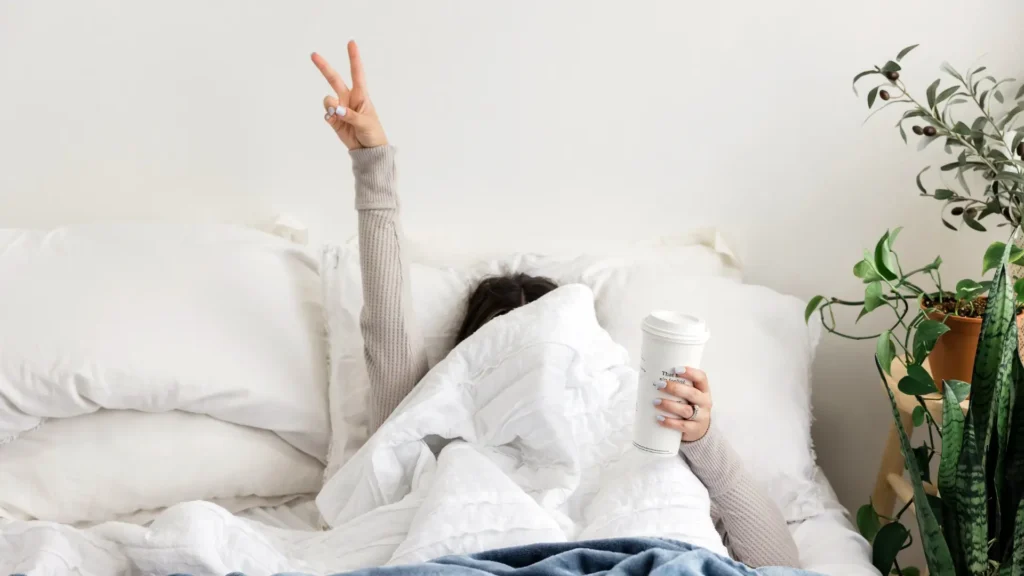Sleep deprivation is a common problem that affects many people in today’s fast-paced world. It means not getting enough quality sleep, which can greatly impact productivity and performance in different areas of life, particularly work.
Good sleep is essential for staying productive at work, and understanding this connection is the first step to enhancing both personal happiness and organizational achievements.
Understanding the Negative Effects of Sleep Deprivation on Work Performance

Sleep quality not only affects our overall health but also plays a pivotal role in our day-to-day productivity. When we don’t get enough sleep, it can have serious consequences on how well we perform at work. Here are some ways sleep deprivation can negatively impact our work performance:
1. Decreased Work Engagement
Work engagement refers to how mentally present, connected, and enthusiastic we are about our job. When we’re sleep-deprived, it’s hard to fully engage with our work. We may feel disconnected and less satisfied with our job, leading to lower productivity. This can also make us feel less capable and motivated.
2. Increased Sickness Absence
Lack of sleep weakens our immune system, making us more susceptible to illnesses. As a result, tired employees are more likely to take sick leaves, leading to higher rates of absenteeism. This not only affects their own workload but can also disrupt team dynamics and project timelines.
3. Decline in Organizational Performance
The negative effects of inadequate sleep aren’t limited to individuals – they can also impact the overall performance of an organization. Companies with sleep-deprived employees might experience:
- Lower quality of work produced
- Longer time taken to complete tasks
- More frequent errors
- Decreased overall standard of work
4. Impaired Cognitive Functioning and Decision-Making
Lack of sleep can significantly impair our cognitive abilities and decision-making skills in the workplace. Essential skills such as problem-solving, memory retention, and concentration are affected when we’re tired, making it harder for us to effectively manage knowledge. This can lead to poor decisions that have negative consequences on both safety and profitability.
5. Reduced Ability to Perform at Optimal Level
Consistently not getting enough quality rest can put us in a state where we’re unable to perform at our best. It becomes challenging to meet deadlines, generate creative ideas, and deliver high-quality work. This can be detrimental to both individuals and organizations.
By addressing sleep issues and prioritizing adequate rest, both individuals and organizations can prevent these negative outcomes and maintain a high level of productivity.
The Vicious Cycle: How Work Demands Contribute to Sleep Problems

Workplace stress and job demands significantly contribute to sleep problems. This creates a cycle where work-induced sleep issues worsen productivity, leading to more stress and even worse sleep deprivation.
How Workplace Stress Affects Sleep
Stress from work can disrupt our natural sleep pattern. When we’re constantly worried about deadlines, workload, or job security, it’s hard to relax and fall asleep. Stress hormones like cortisol keep us alert, making it difficult to get restful sleep.
The Challenge of Irregular Schedules
Irregular schedules also pose a challenge. Shift workers who switch between day and night shifts often struggle with what’s called shift work sleep disorder. Their inconsistent sleep patterns disrupt their internal clock, leading to insomnia and excessive daytime sleepiness.
Even people with regular hours can have problems with “flexible” schedules. Checking emails late at night or working on weekends disturbs the consistency needed for quality sleep.
The connection between work demands and sleep is important to understand. Recognizing its significance is the first step towards breaking this harmful cycle. In the next sections, we’ll discuss practical strategies for dealing with sleep deprivation and creating an ideal environment for restful rest.
Maximizing Productivity: Effective Strategies for Combating Sleep Deprivation

When it comes to enhancing workplace performance, embracing healthy sleep habits can make a significant difference. An important first step is prioritizing sleep. This might seem straightforward, but in the hustle of our busy lives, sleep often takes a backseat.
Setting Consistent Bedtime Routines
One effective approach involves setting consistent bedtime routines. Establishing a regular sleep schedule – that means going to bed and waking up at the same time every day – can help regulate your body’s internal clock, known as the circadian rhythm. This consistency can improve sleep quality and reduce the chances of sleep deprivation.
To illustrate:
“A person who consistently sleeps from 10 p.m. to 6 a.m. may find themselves feeling more refreshed and alert during the day compared to someone with irregular sleep patterns.”
Allotting Time for Sufficient Restorative Sleep
In addition to setting up consistent bedtime routines, it’s also crucial to allot time for sufficient restorative sleep. The National Sleep Foundation recommends adults aim for 7-9 hours of sleep per night. Achieving this duration regularly contributes to better health and improved cognitive function, impacting overall productivity positively.
Creating a Sleep-Friendly Environment
Interestingly, creating a sleep-friendly environment also plays an essential role in combating sleep deprivation. We’ll dive deeper into this in the next section.
Creating an Optimal Sleep Environment for Uninterrupted Rest

An essential part of fighting sleep deprivation is creating a sleep-friendly environment. Ergonomic considerations and sleep hygiene practices play a vital role in this process.
1. Create a Quiet Space
A quiet space is crucial for good sleep. Here are some ways to reduce noise:
- Use earplugs
- Use a white noise machine
- Wear noise-cancelling headphones
These techniques can help block out disruptive sounds and create a soothing atmosphere for rest.
2. Choose the Right Bedding
Bedding choices also significantly influence sleep quality. Here’s what you should consider:
- Invest in a comfortable mattress that supports your body’s natural alignment
- Use pillows that provide adequate neck support
The goal is to minimize discomfort that can cause frequent waking or difficulty falling asleep.
3. Manage Lighting
Lighting plays a crucial role in regulating sleep. Follow these tips:
- Avoid bright lights close to bedtime as they can interfere with melatonin production
- Use dim lights in the evening
- Install blackout curtains or use an eye mask to ensure darkness during sleeping hours
4. Control the Temperature
Temperature can impact sleep as well. Here’s what experts recommend:
- Keep your room cool, ideally between 60-67 degrees Fahrenheit (15-19 degrees Celsius)
5. Keep Your Bedroom for Sleep and Relaxation Only
Reserve your bedroom for activities related to sleep and relaxation only. This helps strengthen the mental association between your bedroom and sleep, making it easier to fall asleep when you enter this space.
By following these steps, you can create an environment that promotes restful, rejuvenating sleep — an effective way to fight sleep deprivation and its negative impact on productivity.
Conclusion
Maintaining a healthy sleep-work balance is essential for long-term success and well-being. Acknowledging the significant impact of sleep deprivation on daily performance and health can help individuals prioritize sleep.
By setting clear work hour boundaries, creating a relaxing sleep environment, and following consistent bedtime routines, you can increase your productivity and overall happiness. It’s important to understand that getting enough quality sleep is not a luxury—it’s a necessity for thriving in today’s busy world.



